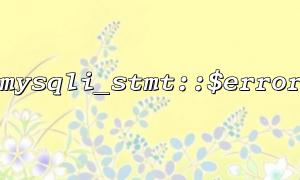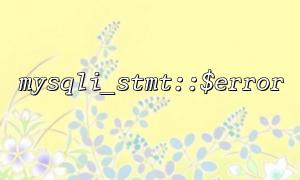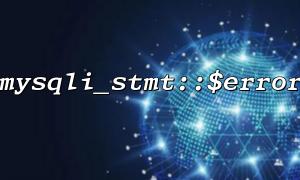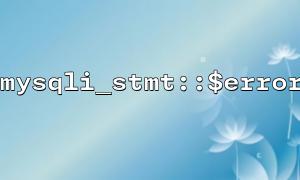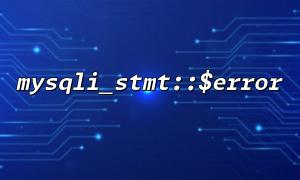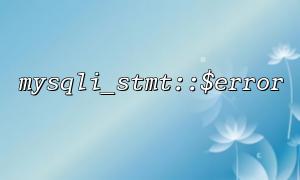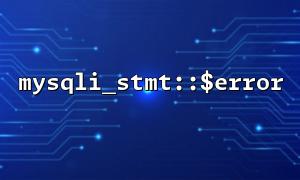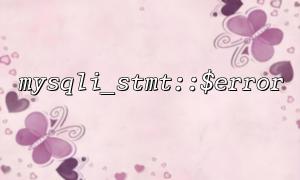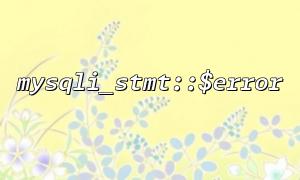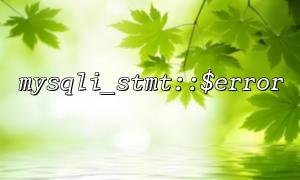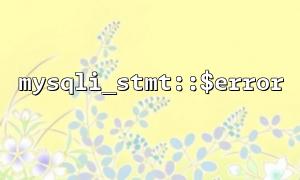When performing MySQL database operations, especially when involving multi-table joint queries (JOIN queries), we often encounter some errors. Debugging these errors can be more troublesome, but using the mysqli_stmt::$error function, we can effectively locate the errors and find solutions. This article will show you how to debug errors in JOIN queries in PHP through this function.
mysqli_stmt::$error is a property in the mysqli_stmt object that stores the error message at the last SQL execution. This property is very helpful for debugging database operations, especially when performing complex SQL queries. If your JOIN query is wrong, you can get specific error information through it to locate the problem faster.
In PHP, we can execute SQL queries through the mysqli extension, including simple SELECT queries and complex JOIN queries. Here is a common example of using JOIN query:
<?php
// Create a database connection
$mysqli = new mysqli('localhost', 'username', 'password', 'database');
// Check if the connection is successful
if ($mysqli->connect_error) {
die('Connection failed: ' . $mysqli->connect_error);
}
// Prepare SQL Statement
$query = "
SELECT users.name, orders.order_date
FROM users
JOIN orders ON users.id = orders.user_id
WHERE orders.status = 'completed'
";
// 创建预处理Statement
$stmt = $mysqli->prepare($query);
// Execute a query
if ($stmt->execute()) {
$result = $stmt->get_result();
while ($row = $result->fetch_assoc()) {
echo $row['name'] . " ordered on " . $row['order_date'] . "<br>";
}
} else {
// If execution fails,Output error message
echo "Error: " . $stmt->error;
}
// Close the connection
$stmt->close();
$mysqli->close();
?>
Suppose an error occurred while executing the above query. We can get the error message through mysqli_stmt::$error . If there is a problem with the query syntax, or if there is a problem with the JOIN operation, the error message will provide a specific clue.
For example, if a table or field name of the query is spelled incorrectly, the following error message may be returned when executing the query:
Error: You have an error in your SQL syntax; check the manual that corresponds to your MySQL server version for the right syntax to use near 'users.id = orders.user_id' at line 3
In this way, mysqli_stmt::$error can help us quickly discover SQL syntax errors, field errors and other problems.
One of the most common mistakes is a misspelling of table names or field names. When using JOIN query, make sure all table and field names are correct. Here are some common mistakes and their solutions:
mistake:
Error: Unknown column 'orders.user_id' in 'on clause'
Solution:
Check whether the user_id field exists in the orders table and confirm whether the field name is correct.
An error can also be raised when writing a JOIN query if the ON clause is forgotten, or if the field is not matched correctly in the JOIN clause.
mistake:
Error: You have an error in your SQL syntax; check the manual that corresponds to your MySQL server version for the right syntax to use near 'JOIN orders' at line 2
Solution:
Check that the JOIN statement is correct, for example, confirm that the ON clause is added and that the fields of JOIN match correctly.
Sometimes, multiple tables are involved in the query, and an error may occur if the relationship between the tables is unclear. For example, if you misuse an alias or field names in the WHERE clause, it may cause the query to fail.
mistake:
Error: Column 'users.id' in field list is ambiguous
Solution:
Use alias for the table in the query to specify the table to which the field belongs. For example, use users.id and orders.user_id to avoid ambiguity.
With the mysqli_stmt::$error function, PHP developers can easily locate and debug errors in JOIN queries. Ensure that SQL syntax is correct, table and field names are correct, and query logic is clear, which can effectively avoid many common errors. During the debugging process, you might as well use this function to help you find and fix problems more quickly.
Related Tags:
mysqli_stmt
